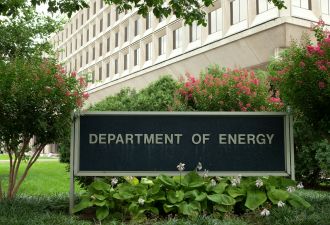On Tuesday, Xcel Energy announced a bold new commitment to achieving 100 percent carbon-free electricity across its service territory by 2050.
The large investor-owned utility has already succeeded in reducing carbon emissions 35 percent below 2005 levels, in an effort to shrink its carbon footprint 60 percent by 2030. Xcel doubled down on its decarbonization efforts earlier this year in announcing a plan to retire two of its coal-fired power units in Colorado and replace them with a $2.5 billion investment in renewables and battery storage, which was approved by regulators in August.
But the utility decided not to stop there.
With today's announcement, Xcel said it plans to cut its carbon emissions 80 percent by 2030, and be entirely carbon-free two decades later across the eight Western and Midwestern states where it operates. According to the utility, this ambitious company target represents a first for the electric power industry.
"We're accelerating our carbon-reduction goals because we're encouraged by advances in technology, motivated by customers who are asking for it and committed to working with partners to make it happen," said Ben Fowke, Xcel Energy's chairman, president and CEO, in a statement.
The 80 percent by 2030 goal will be fairly easy and affordable to meet with currently available technologies, Fowke told reporters in Colorado on Tuesday. His statement aligns with recent comments from Jonathan Adelman, vice president of strategic and resource and business planning at Xcel Energy. In an interview with GTM, Adelman noted that the incremental cost of renewable energy generation is now less than the embedded cost of existing fossil fuels.
Getting all the way to 100 percent clean electricity is the tough part, as it will require deploying technologies that are not currently cost-effective or are commercially unavailable. It's notable that Xcel did not set a goal to achieve 100 percent renewable energy generation, allowing for a wider range of possible solutions, including nuclear power and carbon capture.
Xcel could be choosing to get out ahead of possible legislation after Colorado Governor-Elect Jared Polis ran a campaign on moving his state — where Xcel is the largest utility — to 100 percent renewable energy by 2040. It's also expected that Democrats will introduce several new measures to cut carbon emissions and boost renewables when they take control of the state legislature in January.
In Arizona, the state's largest utility, Arizona Public Service, just spent a record amount to defeat a ballot measure that would have mandated utilities reach a 50 percent renewable energy mix by 2030. APS told GTM over the summer that the ballot, as written, would have serious negative implications for its Palo Verde nuclear power plant and ultimately would be a more expensive way to combat climate change.
California lawmakers avoided a clash over an ambitious 100 percent target by making it a clean electricity goal rather than a renewable energy target, affording the state's utilities some flexibility.
In Colorado, Xcel appears to be setting the stage for policies that align with its goals and avoiding the controversy surrounding mandates.
Alice Jackson, president of Xcel Energy’s Colorado branch, told The Colorado Sun that legislation isn't necessary for Xcel to move forward with its 100 percent plan. However, legislation would allow the utility to “really dig into those new technologies” and progress toward its target faster, she said.
Jackson added that Xcel thinks the plan “goes a long way to addressing what Gov.-Elect Polis’ administration was running their platform on," given that increasing renewable energy is really about reducing carbon emissions.
Xcel Energy's plan has been widely praised, including by Polis.
”When I launched my campaign back in 2017 we had a bold agenda for our state to get to 100 percent renewable by 2040,” said the Colorado governor-elect in a statement. “Xcel Energy’s exciting announcement today, along with the strong climate goals communities like Pueblo, Summit County, Ft. Collins, Denver and others across the state have embraced, shows we are leading the way forward right here in Colorado — by committing to a renewable and clean energy future.”
Fred Krupp, president of the Environmental Defense Fund, said that Xcel's "groundbreaking climate commitment is an act of true leadership."
Mary Anne Hitt, senior director of the Sierra Club’s Beyond Coal campaign, said that Xcel's announcement is proof that "investing in clean energy is smart for business, local economies and jobs." But the Sierra Club criticized Xcel for continuing to invest in fossil fuels in the upper Midwest, with a recently-announced plan to add more natural gas. That plan suggests the utility is banking on carbon capture to become economically compelling before 2050 rolls around.




